There has been a lot of conversation around equality in recent times. When we talk about equality we tend to focus on areas like race, class, and gender. But how about we look closer to home? What about equality in a relationship? Are we practicing fairness in our relationship with our romantic partner?
Is there abuse of power at home? Does one of you show controlling behavior? Do you both have an equal chance at personal growth? These questions are important to have a true picture of the power dynamics between partners. Small power imbalances often go unchecked and may lead to unfortunate incidents of abuse and violence.
A study of 12 self-identifying egalitarian heterosexual married couples revealed what it called the “myth of equality”, saying that while couples very well know how to use the “language of equality” none of the relationships truly practiced equality. So, how can you be sure if your relationship is that of equals? What are the signs of an unequal relationship and what can one do to keep them at bay?
We consulted counseling psychologist Shivangi Anil (Master’s in Clinical Psychology), who specializes in pre-marital, compatibility, and boundary counseling, to help us understand equality better and recognize the signs of imbalance of power. Read till the end for her invaluable expert tips on fostering equality in your relationship.
What Exactly Is An Equal Relationship?
Table of Contents
Reciprocity in relationships feels starkly different from an unfair or one-sided relationship where one person invests considerably more time, effort, energy, and financial and emotional support than the other. Here are a few examples of equality in a relationship that may help you recognize what kind of a power balance you currently have with your partner:
| Equal Or Balanced Relationships | Unequal Or One-sided Relationships |
| You value your partner and feel valued by them. Your self-esteem feels high | You feel short-changed. You have built-up resentment against your partner that you cannot communicate |
| You feel rewarded and appreciated by your partner | You feel taken for granted or exploited |
| You feel safe and secure in the relationship | You feel like you have to constantly prove your worth or prove useful or else you won’t be needed |
| You feel you can trust the relationship and depend on your partner | You feel like things will never get done if you don’t do them |
| You feel taken care of, heard, seen. You don’t feel afraid to communicate your needs | You feel abandoned, neglected or uncared for or your needs not noticed enough |
Most studies and surveys on equality in relationships tend to only highlight gender inequality and bias in relationships. Our observation is that equality in relationships is multi-faceted. The power balance in a relationship can tip to either side based not only on gender but other factors such as age, background, and individual personalities of the partners as well.
Let us look at Rory, 38, and Julia, 37, who have been married for 10 years. Both make the same amount of money and come from similar social backgrounds, but Rory ends up doing most of the emotional work for the two of them. He not only works longer hours but also shares equal domestic load and childcare responsibilities. Even though it is usually Julia who has the last word on their next vacation spot, Rory ends up making travel arrangements, planning dates, etc.
Rory and Julia do not demonstrate a knack for fostering fairness and equality in their relationship. Rory clearly gives more. He may be doing it enthusiastically but it wouldn’t be a surprise if he feels burnt out and unexpectedly lashes out one day with sheer frustration. “In a relationship of equals the needs and interests of both partners are equally invested in and taken care of,” says Shivangi. That is not the case with Rory and Julia.
4 Signs Your Relationship Is Based On Inequality
Social psychology lays this idea of fairness as Equity Theory. It simply means that the “gives” in all relationships should be equal to the “takes”. If one partner ends up feeling under-rewarded, frustration, anger, and disappointment begin to creep in. Most interestingly, feeling over-rewarded is not a healthy feeling either, often leading to guilt and shame.
The instinct, then, is to restore that balance through a power struggle. Unfortunately, most of us are not equipped to do so and end up causing harm to ourselves or others. We lash out or try to break the relationship off. To avoid jeopardizing your relationship, it might help to recognize signs of an unequal relationship and take action on equalizing the tipping balance before it’s too late.
Related Reading: Causes & Signs Of An Emotionally Exhausting Relationship And How To Fix Them
1. One of you has one-sided decision-making power
“To spot signs of inequality, we need to pay attention to where the decision-making power lies,” says Shivangi, “And by decision, I don’t mean financial or “big” decisions alone. Decisions about where you stay, what you eat, and whom you both interact with as a couple. Who makes decisions is important to gauge the dynamics of power.” Think about the following questions. While the answers cannot be neatly divided 50-50, they should not be heavily skewed toward one side.
- Who decides what to order?
- Whose favorite vacation spots do you visit?
- Who decides which TV channels to subscribe to?
- When it comes to making big purchases, who has the last word?
- Whose aesthetic is largely reflected all over the house?
- Who has control of the AC temperature?
Related Reading: How To Do More Than Just The Bare Minimum In A Relationship
2. There is instructive communication from one partner to the other
While we have heard loads about the importance of communication in relationships, it is important to be conscious of the nature of communication. Shivangi says, “Another important sign of inequality is when channels of communication are one-sided. When one person instructs and the other follows, there is limited or no space for one partner’s thoughts, ideas and disagreements to be heard.”
Are either you or your partner always the only one to tell the other person how you feel, what you want, and what you expect? Sensitive individuals often end up biting more than they can chew precisely because of this reason. They hear the needs of their partner and feel pushed to take on more responsibility without expressing their own needs.
3. There are only one-party compromises
Working through disagreements often requires compromise. In other words, going with one person’s preference over another’s. Beach vacation or hillside? Fancy car or a utilitarian one? Chinese takeout or boxed meals? Guest room or game room? Ask yourself, during arguments and differences of opinion, whose choice or opinion do you repeatedly end up adopting?
Shivangi says, “While a compromise is important and often the way to go, it is unfair and unequal if only one of the partners is always sacrificing in the relationship.” So, if you feel strongly about the utilitarian car, it is only fair to let your partner have the extra room turned into the room they want.
Related Reading: 12 Things You Should Never Compromise On In A Relationship
4. One partner always has the last word
In imbalanced relationships, it’s almost always the same partner who has the last word in an argument. Often, quite literally. Observe, during a discussion, after a bit of back and forth between you and your partner, who always has the last word and who gives up and backs down.
Shivangi says, “This often happens when one person looks at arguments as a way to always win. But that should never be the idea behind debates and discussions. Arguments can be healthy if couples find a mutually acceptable way around the concern at hand.”
This tendency also extends to seemingly trivial quarrels such as opinions on a film you saw, a restaurant you visited, or a person you met. But if one partner always has the last word on what to make of the experience, the feeling of being rejected collects over time and makes the other partner feel undervalued and disrespected.
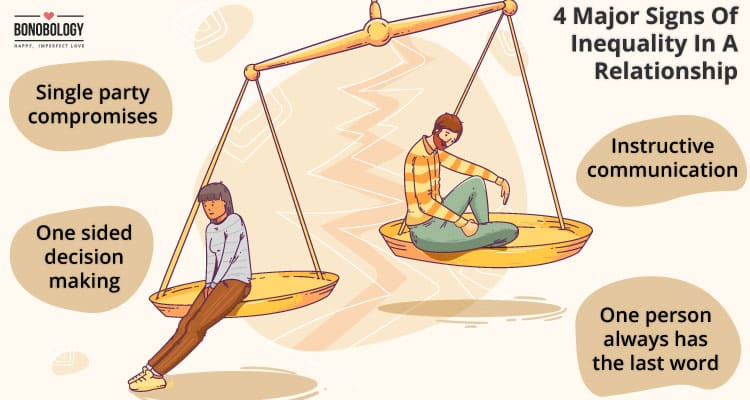
7 Expert Tips To Foster Equality In A Relationship
So, what to do about it? To approach this wisely we asked our expert the most pertinent question first – why is inequality damaging to a relationship? She said, “Inequality harbors an unequal power dynamic wherein the person in a more powerful position can impose their needs and demands on the other person. In extreme cases, a skewed power dynamic can also allow for abuse and violence.”
If that scenario is too harsh to imagine, to put it mildly, she added, “A lack of equality can make one partner feel disrespected which results in resentment that harbors anger and ultimately leads to conflict.” It’s clear. Focus on having a healthy balance of “give” and “take” to build a strong bond with your partner. Here are a few important tips from Shivangi that may help you do just that.
1. Open channels of communication from both sides
Open and constant communication is the foundation and the backbone of a romantic connection. Which is why Shivangi puts it first on the list. She says, “There should always be equal space for both partners to express themselves.”
Both partners should regularly communicate their needs. The one who currently feels sidelined and emotionally deserted by their partner should make a deliberate effort in their relationship to be more assertive. The other partner should ensure and encourage a safe space for communication.
2. Insist on active listening
“Being heard, attentively and actively, is as important as being able to communicate in a relationship,” says Shivangi. Communication is only half done if the emotion doesn’t reach the other end. She clarifies, “By being a good listener, I mean listening to understand and not merely respond. This includes non-verbal and emotive cues as well.” To practice active listening, try the following:
- Keep whatever you are doing aside – phone, laptop, work, etc
- Look your partner in the eye
- Make pillow talk a ritual
- Say things that make them feel you are listening
- Ask questions to encourage your partner to speak more
Related Reading: Expert Talks About 9 Must-Try Couples Communication Exercises
3. Identify controlling behavior
There is a difference between having leadership qualities and being a control freak. While leadership quality is a positive trait and can help not just your partner but the entire family in a time of crisis, the need to control is what you should be wary of. Here are some examples of controlling behavior in familial settings:
- Need to order other members of the family around
- Making decisions on behalf of others
- Reluctance to consult others
- Assuming that others will make mistakes
This need for control is the root cause of uneven power distribution between a couple. Have accountability for such behavior. Identify it when it happens and lay responsibility.
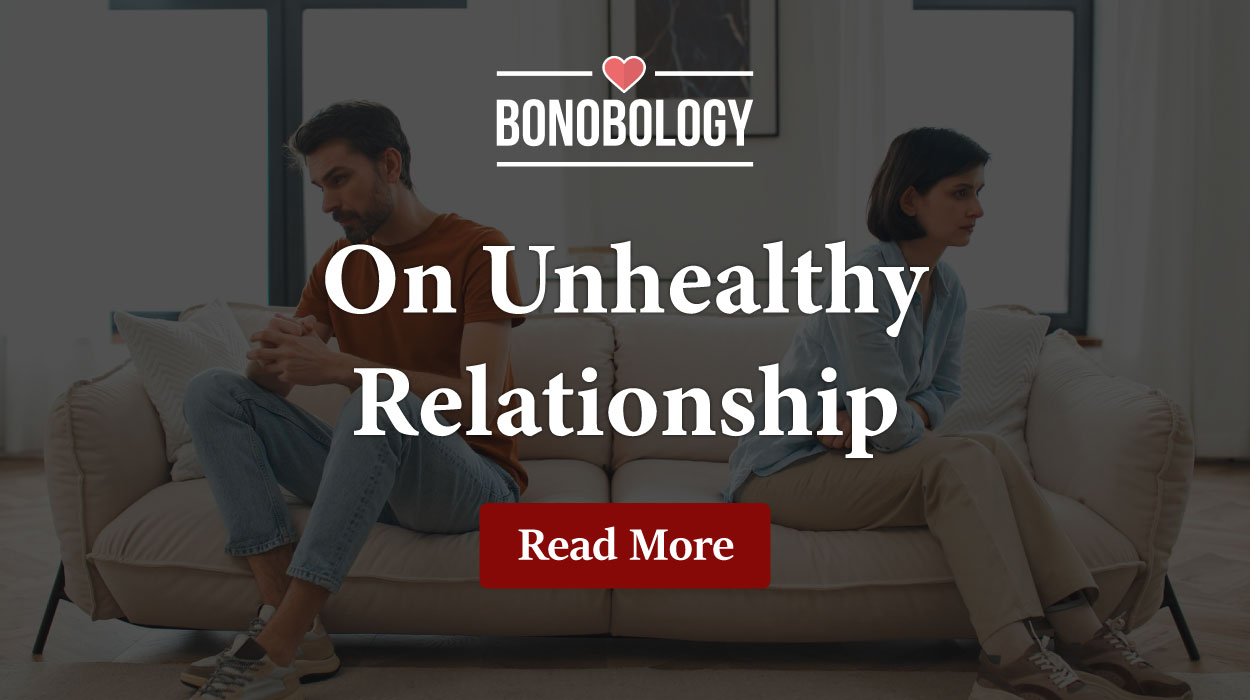
4. Have space for individuality
Shivangi says, “We often find that one partner takes on the interest and hobbies of the other to create an emotional bond; ideally, this should always be a two-way street. Make sure there is space for individuality, for both partners.”
So, what should one do? The dominating partner should actively encourage the other to take out time and personal space for themselves. Another simple practice you can adopt is to actively ask the more accommodating partner for their choice when thinking of what to do for the weekend, what to order for dinner, which film to watch, and where to go for the next holiday.
5. Split chores at home by recognizing your strengths
Shivangi says, “Share the load. It sounds simple but is easier said than done. Even so, do your bit at home, even if only one of you is earning.” This advice is crucial for households where one member earns and the other takes care of the household. While professional labor stops at a fixed o’clock, household responsibilities never do, making the arrangement extremely unfair to the partner in charge of home duties.
Recognize each of your strengths and likes, and split household chores accordingly for this to be sustainable. On the off chance that one of you doesn’t enjoy doing anything, remind yourself of the damage that inequality in a relationship can cause. Pull up your socks and take charge.
Related Reading: Stereotyping Men: Why It’s Time To Think Outside The ‘Man Box’
6. Set your boundaries and respect your partner’s
When one thinks of examples of equality in a relationship, they all come down to respecting your partner’s boundaries and individuality. Respect is the key word when talking about equality. Shivangi says, “Boundaries are crucial to retaining individuality, managing conflict, and sharing a strong emotional connection. Set boundaries associated with time, money, sex, intimacy, and other areas. And honor those of your partner.” Need we say more?

7. Develop fondness and friendship with your partner
Like your partner! Yes, you read that right. Shivangi says, “It’s important to build common interests and conversation topics outside of your roles as partners, family members, or parents. This can be done by thinking of your partner as your friend. Literally, imagine a day with friends and try and spend that kind of a day with your partner.” Other things that Shivangi suggests are:
- Explore common interests
- Be supportive of each other’s goals
- Have deep conversations often
- Reminisce old memories
- Do things that once connected you, again
Key Pointers
- In a relationship of equals, the needs and interests of both partners are equally invested in and taken care of
- In one-sided relationships, one person invests considerably more time, effort, energy, and financial support than the other
- One-sided decision-making, controlling behavior, instructive communication, and one-party compromises are a few signs of an unequal relationship
- Display more equality in a relationship by having two-sided communication, listening actively, nurturing individuality, splitting chores equally, setting healthy relationship boundaries, and fostering friendship and fondness for your partner
- To learn how to get equality in a relationship by resolving deep-rooted patterns of control, dominance, lack of assertiveness, low self-esteem, trust issues, etc, consult a professional therapist
“I don’t think there is one single definition of equality when it comes to romantic relationships”, Shivangi concludes. “It also depends on how a couple defines equality and how that gets reflected in their day-to-day actions. Equality is not just a black-and-white division of income and chores. It’s about knowing each partner’s strengths, weaknesses, and what works for the couple.”
If you and your partner suffer from an unhealthy imbalance in your relationship and can’t seem to fix it, it is possible that your controlling behavior, trust issues, or your co-dependence on your partner and inability to assert yourself, are deeply ingrained in your psyche. In such cases, professional counseling can prove invaluable. Should you need that help, Bonobology’s panel of experts is here to help you.
10 Signs You Are In A Truly Stable Relationship (Even If You Feel Otherwise)
What Are The 5 Stepping Stones In A Relationship And Why Are They Important?
How To Fix A Relationship When One Is Losing Feelings – Expert Recommended Tips
Your contribution does not constitute a charitable donation. It will allow Bonobology to continue bringing you new and up-to-date information in our pursuit of helping anyone in the world to learn how to do anything.

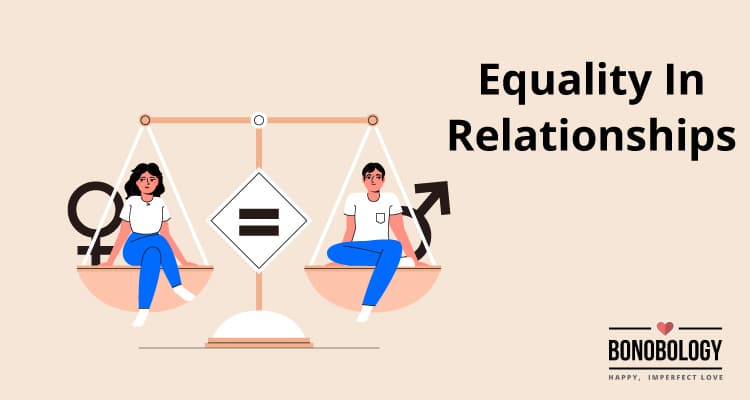



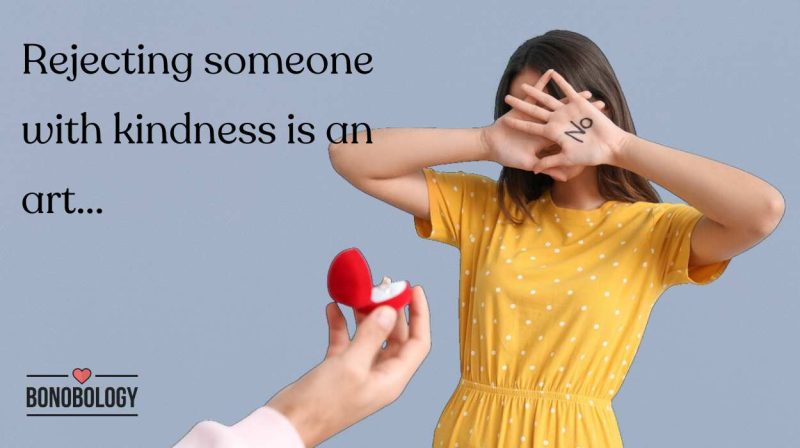
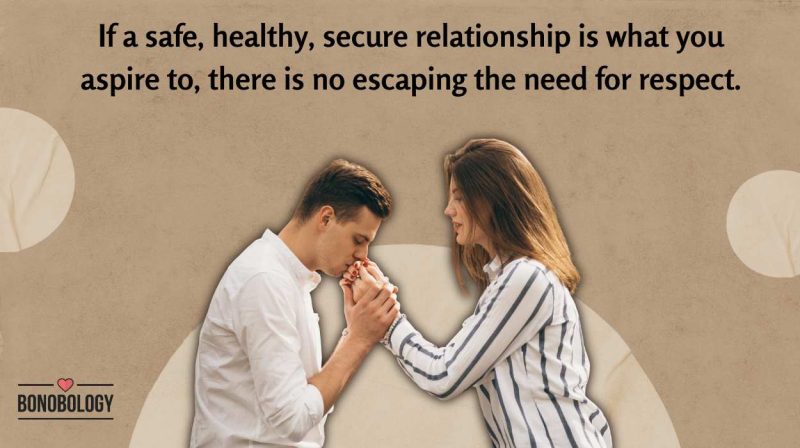

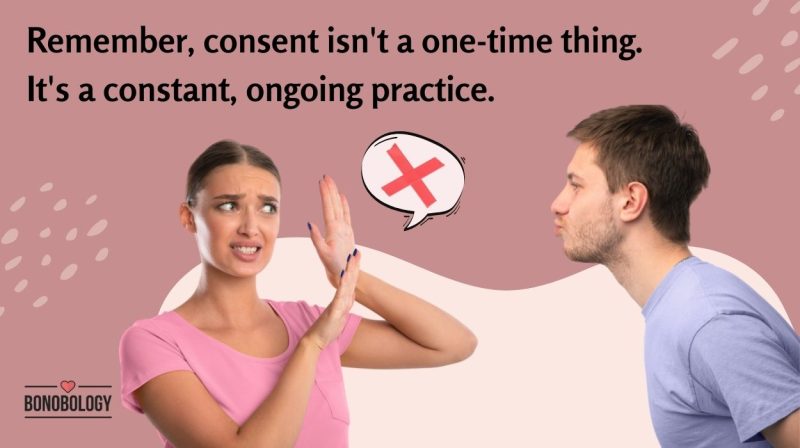

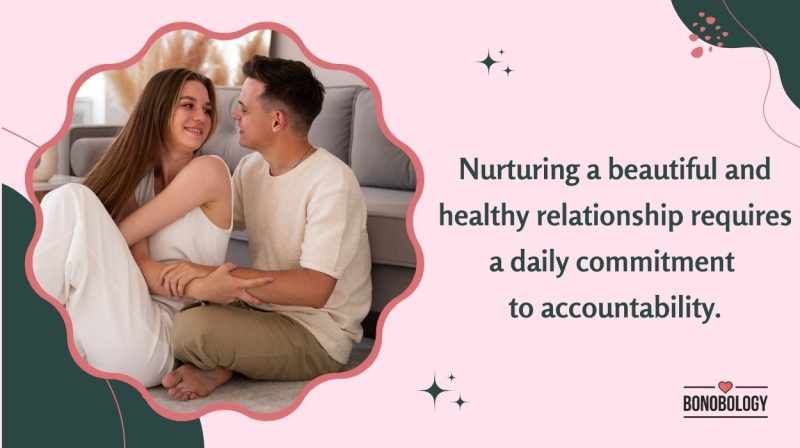
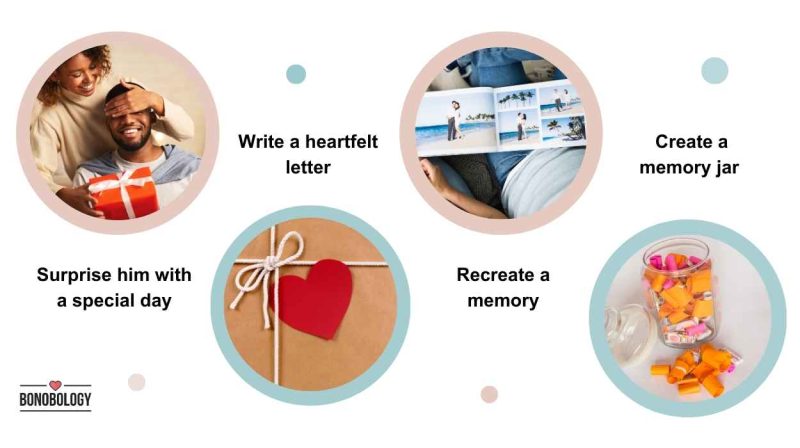
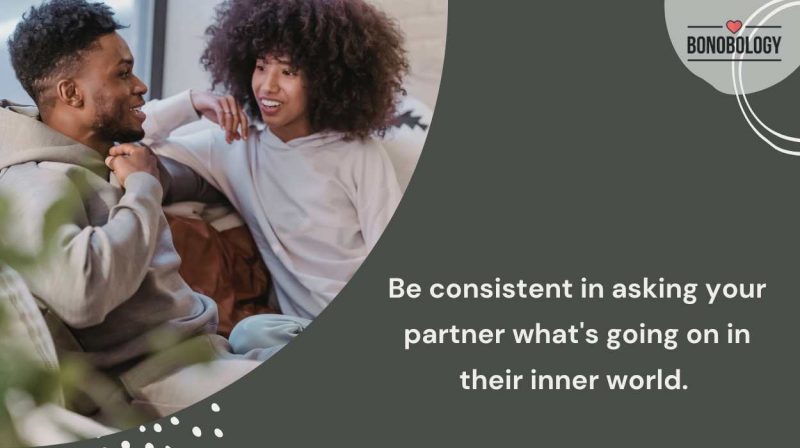

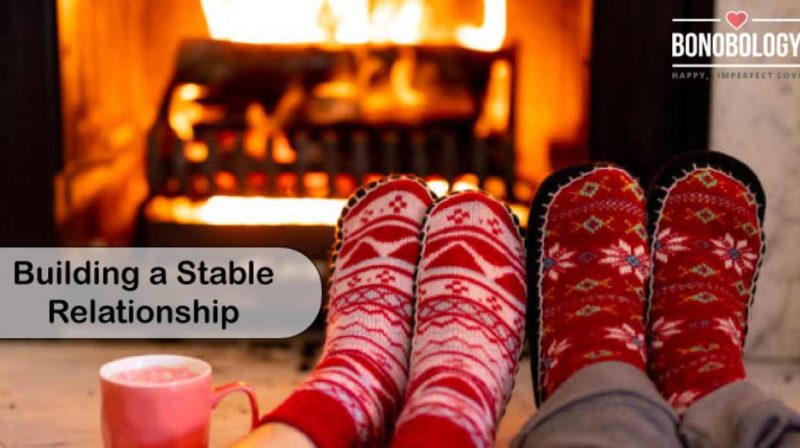


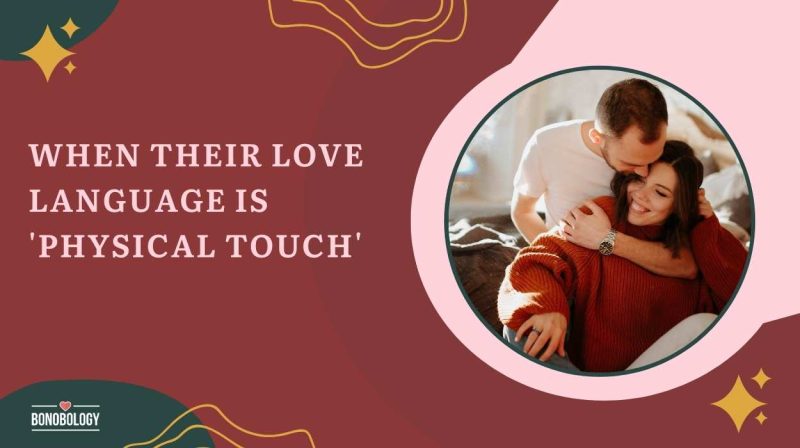
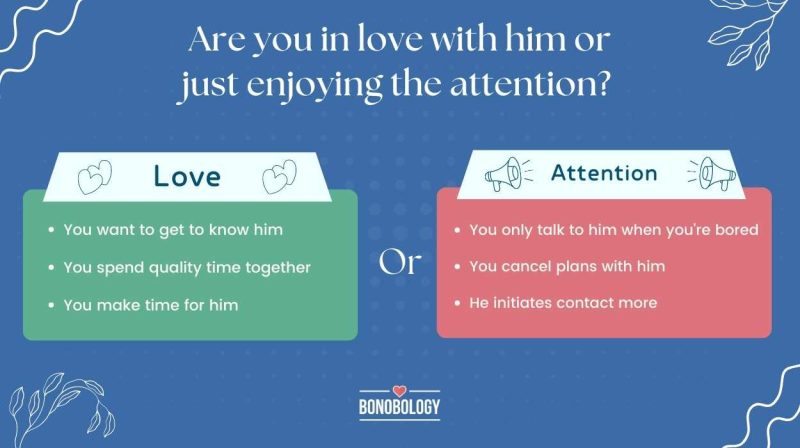
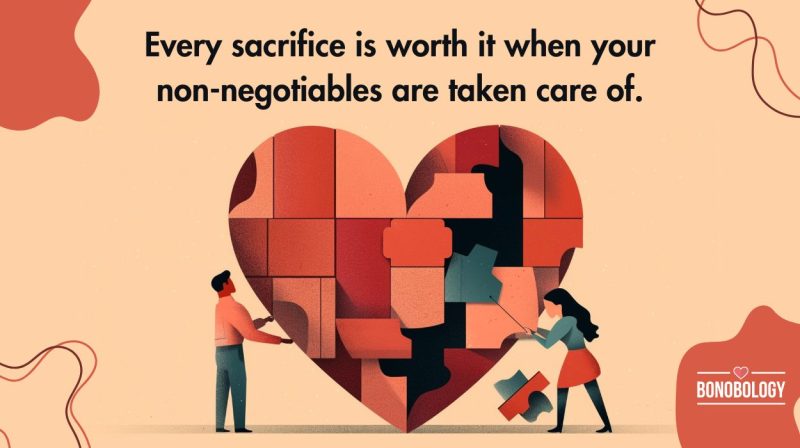
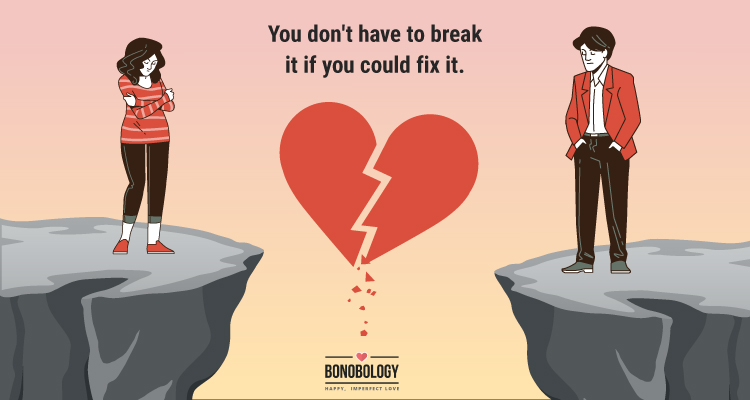
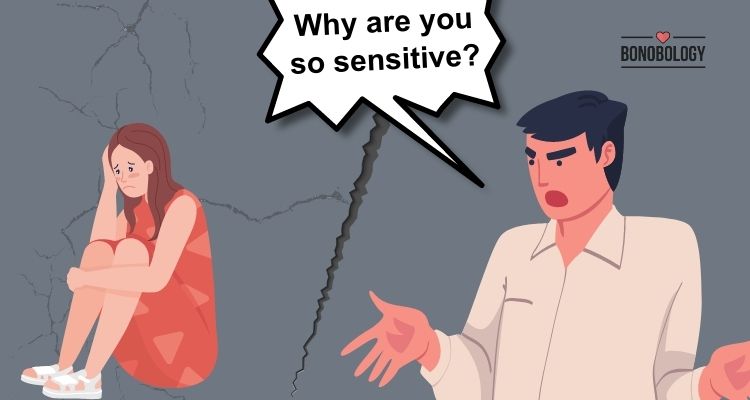

Featured
6 Tips for Helping Your Partner Quit Smoking in Their 50s
How He Treats You Is How He Feels About You — Is It True?
How To Let Someone Down Easy With Kindness And Grace — 13 Tips
How To Show Respect In A Relationship — 9 Ways
The Pitfalls Of Nice Guy Syndrome: How It Affects Relationships
Navigating The Complexities Of Consent In Modern Relationships
11 Ways To Deal With A Sexually Demanding Husband
Accountability In Relationships – Meaning, Importance, And Ways To Practice
How To Apologize To Your Boyfriend: 15 Ways
10 Thought-Provoking Relationship Check-In Questions for Deeper Connection
Is A Monogamous Relationship Right For You? 11 Questions To Help You Find Out
10 Signs You Are In A Truly Stable Relationship (Even If You Feel Otherwise)
7 Subtle Signs Your Partner is Quiet Quitting Your Relationship
Secure Relationships – What Are They And What Do They Look Like?
Physical Touch Love Language: What It Means With Examples
Do I Like Him Or The Attention? Ways To Find Out The Truth
17 Non-Negotiables In Relationships You Must Never Compromise On
15 Ways To Solve Relationship Problems Without Breaking Up
9 Common Narcissist Gaslighting Examples We Hope You Never Hear
The Most Important 7 Qualities Of A Healthy Relationship